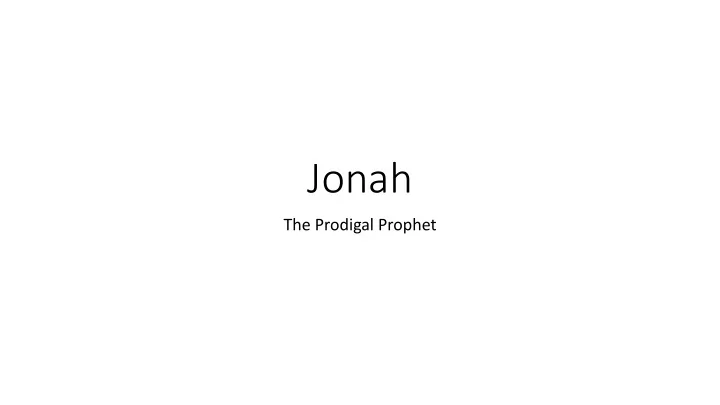

Jonah The Prodigal Prophet
The call of Jonah • The word of the Lord came to Jonah son of Amittai: “Go to the great city of Nineveh and preach against it, because its wickedness has come up before me.” • Jonah is called to be a prophet to a Gentile city • Jonah, our silent prophet. • Called to go up, he goes down. Called to go east, he goes west. From being in God’s presence he flees God’s presence.
The ship and the mariners • Jonah runs, but God won’t let him go. • For Jonah- the storm is the consequence of his sin- but the sailors are caught up in it too. • Gentile sailors are more awake than Jonah. Jonah is fast asleep in his own self- interest. • Right belief is no better than wrong belief it is not corroborated by right actions. • Jonah becomes the scapegoat.
The Fish and the Prayer • Now the Lord provided a huge fish to swallow Jonah, and Jonah was in the belly of the fish three days and three nights. • Jonah’s prayer shows us how to pray in the midst of failure. • What I have vowed I will make good. I will say, ”Salvation comes from the Lord.” (2:9)
Nineveh’s Response • Jonah has more success than other prophets as Nineveh repents. • “By the decree of the king and his nobles: Do not let people or animals, herds or flocks, taste anything; do not let them eat or drink. But let people and animals be covered with sackcloth. Let everyone call urgently on God. Let them give up their evil ways and their violence. Who knows? God may yet relent and with compassion turn from his fierce anger so that we will not perish.” When God saw what they did and how they turned from their evil ways, he relented and did not bring on them the destruction he had threatened. (3:7-10)
Jonah’s Anger • “But to Jonah this seemed very wrong and he became angry.” (4:1) • The will of God and the political fortunes of Israel seem to be going in different directions. • Jonah uses God’s own words against God. • Jonah felt that mercy had to be deserved. • God describes Nineveh as a people “who do not know their right hand from their left.” What a gracious way to describe Nineveh?
Do you know this Jesus? • As he approached Jerusalem and saw the city, he wept over itand said, “If you, even you, had only known on this day what would bring you peace — but now it is hidden from your eyes.” (Luke 19:41 -42) • “Yet enemies, and others who do not fit into our scheme of understanding, have a particular role to play in God’s gracious economy. They may well be God’s way of opening us up to a greater God than we are able to perceive from within our own bunker of belief. The living Lord is always greater than we humans can know…To accept that in his freedom God may use our enemies to challenge and teach us, to enable us to grow into a deeper maturity and a greater likeness to Christ, may prove to be a painful and humiliating growth point. The command to “love your enemies”, to pray for them and be actively kind towards them, has never been an easy or popular teaching.”
Conclusion • “And should I not have concern for the great city of Nineveh, in which there are more than a hundred and twenty thousand people who cannot tell their right hand from their left —and also many animals?” • Who has God put on your mind today? • Who are your personal Ninevites? • The life of servanthood is not limited to those who deserve it.
Resources • Keller, Tim. The Prodigal Prophet: Jonah and the Mystery of God’s Mercy. New York, New York: Viking Publishers, 2018. • Nixon, Rosemary. Motyer, J. A. ed. The Message of Jonah. Downers Grove, Illinois: Inter Varsity Press, 2003. • Ogilvie, Lloyd J. ed. The Communicators Commentary: Hosea, Joel, Amos,. Obadiah, Jonah. Dallas, Texas: Word Books Publisher, 1990.
Recommend
More recommend